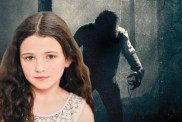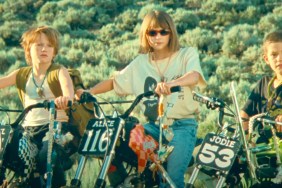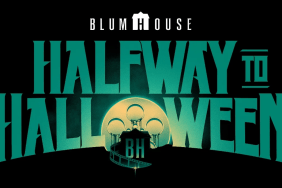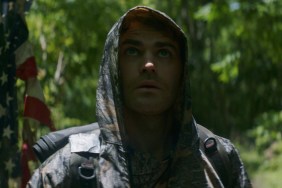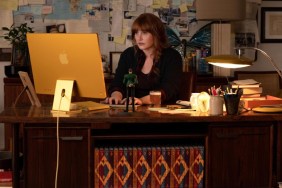
7.5 out of 10
Cast:
Elizabeth Reaser as Alice Zander
Annalise Basso as Paulina Zander
Lulu Wilson as Doris Zander
Henry Thomas as Father Tom
Parker Mack as Mikey
Sam Anderson as Mr. Browning
Kate Siegel as Jenny Browning
Doug Jones as Marcus
Alexis G. Zall as Betty
Halle Charlton as Ellie
Ele Keats as Ellie’s Mom
Nicholas Keenan as Walter
Lin Shaye as Old Paulina Zander
Directed by Mike Flanagan
Ouija: Origin of Evil Review:
Did you see the first Ouija? Were you desperate to know more about its unnecessarily-confusing backstory? If the answer to either or both of those questions was no, well, you’re getting it anyway, and in a surprise twist worthy of a great horror movie, it turns out to be everything the first film wasn’t.
Taking place some fifty years before the first film, Ouija: Origin of Evil does away with the surviving characters of the last film to explore the story of the ghosts who plagued them and how they came to be trapped in that old house. More importantly, it does away with the behind-the-camera creatives and puts the series in the hands of up-and-coming horror director Mike Flanagan (Oculus), who in one stroke suddenly imbues the series with scope and vision.
From the appearance of the ’60s Universal logo (tying the film into its ’60s-era presentation) to the title drop in classic full screen optical style complete with serial number at the bottom, Ouija: Origin of Evil drips with nostalgia. Nor does Flanagan stop there, stealing shots and camera moves from Roger Corman’s American International days.
Cinematographer Michael Fimognari, who has worked with Flanagan on several of his previous films, coats the screens in the rich greens and golds reminiscent of old Eastman Color just to add to the feeling of spying on a past world. They’ve even gone so far as to institute fake cigarette burns for reel changes. It’s all about invoking a feeling of nostalgia for a certain look and feel of days gone by (particularly appealing for film fans known to luxuriate in old-time methods returning anew) and it’s all very much on purpose. Ouija: Origin of Evil is an indictment of nostalgia.
Alice Zander (Reaser) is a woman who, in her own daughter’s (Basso) words, ‘needs to know there was some sort of life after death.’ Ghost stories are, at their core, metaphors for the past and our objectification of it. Zander herself understands that, working as a medium to help people put their own personal demons to rest and find closure with the past and to raise her daughters as a recently single mother.
When elder daughter Paulina suggests she add a Ouija board to the act as a change of pace, the family unknowingly awakens younger daughter Doris’ latent channeling abilities, unleashing a horde of malevolent spirits into the lives in the process.
A lot of that comes down to the fantastic work of Basso and Wilson as the young daughters caught in the grip of powers they can’t fully understand. Wilson in particular has to combine Doris’ cheerful acceptance of her new gift with a studied eeriness once the spirits she has called up become too much for her to handle.
Flanagan (who also co-wrote the screenplay) asks a lot of his young leads – Origin of Evil would fall apart under its own seriousness if they weren’t up to the task – but he also gives them the benefit of a solidly-constructed story to support them. Rather than starting off with jump scares and rising corpses, he takes his time to build the stakes, replacing it with fantastic sequences like Alice’s first Ouija reading, which provokes Doris to answer in a different room of the house where no one can see her but the audience.
Real suspense often comes down to the audience having more knowledge than the characters and Flanagan proves himself a master at developing that very difficult idea, though it may be a bit of a wait for modern audience. The classic horror movie material doesn’t really get going until the third act.
It’s not perfect by any means. Despite focusing on just a handful of characters, there’s no real effort made to develop their inner lives; they remain primarily devices for driving the plot. But for all that, he does make the audience care for them and what they go through, imbuing his scares with tragedy, which is what makes horror stick.
More importantly, in a modern pop culture age where nostalgia is increasingly a cornerstone of anything getting made, it’s surprising and refreshing that a filmmaker not only makes that longing the center of their film but casts a critical eye on the practice as if to warn us of the inherent psychic dangers involved.
In every way superior to the first film, Ouija: Origin of Evil does what a prequel should do, provide revelation which deepens characters we thought we knew something about without throwing out all that went before or simply re-enacting well known bits (it’s helped by the fact that Ouija had no well-known bits). More importantly, it proves the need for real vision on the filmmaker’s part and that a director who has that can make something out of even the goofiest premise.
Ouija: Origin of Evil
-
Ouija: Origin of Evil

LULU WILSON as Doris in "Ouija: Origin of Evil." Inviting audiences again into the lore of the spirit board, the supernatural thriller tells a terrifying new tale as the follow-up to 2014’s sleeper hit that opened at No. 1. In 1965 Los Angeles, a widowed mother and her two daughters add a new stunt to bolster their séance scam business and unwittingly invite authentic evil into their home. When the youngest daughter is overtaken by the merciless spirit, this small family confronts unthinkable fears to save her and send her possessor back to the other side.
-
Ouija: Origin of Evil

LULU WILSON as Doris in "Ouija: Origin of Evil." Inviting audiences again into the lore of the spirit board, the supernatural thriller tells a terrifying new tale as the follow-up to 2014’s sleeper hit that opened at No. 1. In 1965 Los Angeles, a widowed mother and her two daughters add a new stunt to bolster their séance scam business and unwittingly invite authentic evil into their home. When the youngest daughter is overtaken by the merciless spirit, this small family confronts unthinkable fears to save her and send her possessor back to the other side.
-
Ouija: Origin of Evil

HENRY THOMAS as Father Tom in "Ouija: Origin of Evil." Inviting audiences again into the lore of the spirit board, the supernatural thriller tells a terrifying new tale as the follow-up to 2014’s sleeper hit that opened at No. 1. In 1965 Los Angeles, a widowed mother and her two daughters add a new stunt to bolster their séance scam business and unwittingly invite authentic evil into their home. When the youngest daughter is overtaken by the merciless spirit, this small family confronts unthinkable fears to save her and send her possessor back to the other side.
-
Ouija: Origin of Evil

(L to R) LULU WILSON as Doris and ELIZABETH REASER as Alice, her mother, in "Ouija: Origin of Evil." Inviting audiences again into the lore of the spirit board, the supernatural thriller tells a terrifying new tale as the follow-up to 2014’s sleeper hit that opened at No. 1. In 1965 Los Angeles, a widowed mother and her two daughters add a new stunt to bolster their séance scam business and unwittingly invite authentic evil into their home. When the youngest daughter is overtaken by the merciless spirit, this small family confronts unthinkable fears to save her and send her possessor back to the other side.
-
Ouija: Origin of Evil

(L to R) ANNALISE BASSO as Lina and ELIZABETH REASER as Alice, her mother, in "Ouija: Origin of Evil." Inviting audiences again into the lore of the spirit board, the supernatural thriller tells a terrifying new tale as the follow-up to 2014’s sleeper hit that opened at No. 1. In 1965 Los Angeles, a widowed mother and her two daughters add a new stunt to bolster their séance scam business and unwittingly invite authentic evil into their home. When the youngest daughter is overtaken by the merciless spirit, this small family confronts unthinkable fears to save her and send her possessor back to the other side.
-
Ouija: Origin of Evil

ANNALISE BASSO as Lina in "Ouija: Origin of Evil." Inviting audiences again into the lore of the spirit board, the supernatural thriller tells a terrifying new tale as the follow-up to 2014’s sleeper hit that opened at No. 1. In 1965 Los Angeles, a widowed mother and her two daughters add a new stunt to bolster their séance scam business and unwittingly invite authentic evil into their home. When the youngest daughter is overtaken by the merciless spirit, this small family confronts unthinkable fears to save her and send her possessor back to the other side.
-
Ouija: Origin of Evil

(L to R) ALICE REASER is set upon by LULU WILSON as her daughter Doris in "Ouija: Origin of Evil." Inviting audiences again into the lore of the spirit board, the supernatural thriller tells a terrifying new tale as the follow-up to 2014’s sleeper hit that opened at No. 1. In 1965 Los Angeles, a widowed mother and her two daughters add a new stunt to bolster their séance scam business and unwittingly invite authentic evil into their home. When the youngest daughter is overtaken by the merciless spirit, this small family confronts unthinkable fears to save her and send her possessor back to the other side.
-
Ouija: Origin of Evil

LULU WILSON as Doris in "Ouija: Origin of Evil." Inviting audiences again into the lore of the spirit board, the supernatural thriller tells a terrifying new tale as the follow-up to 2014’s sleeper hit that opened at No. 1. In 1965 Los Angeles, a widowed mother and her two daughters add a new stunt to bolster their séance scam business and unwittingly invite authentic evil into their home. When the youngest daughter is overtaken by the merciless spirit, this small family confronts unthinkable fears to save her and send her possessor back to the other side.
-
Ouija: Origin of Evil

(L to R) ANNALISE BASSO as Lina and LULU WILSON as Doris in "Ouija: Origin of Evil." Inviting audiences again into the lore of the spirit board, the supernatural thriller tells a terrifying new tale as the follow-up to 2014’s sleeper hit that opened at No. 1. In 1965 Los Angeles, a widowed mother and her two daughters add a new stunt to bolster their séance scam business and unwittingly invite authentic evil into their home. When the youngest daughter is overtaken by the merciless spirit, this small family confronts unthinkable fears to save her and send her possessor back to the other side.
-
Ouija: Origin of Evil

ELIZABETH REASER as Alice in "Ouija: Origin of Evil." Inviting audiences again into the lore of the spirit board, the supernatural thriller tells a terrifying new tale as the follow-up to 2014’s sleeper hit that opened at No. 1. In 1965 Los Angeles, a widowed mother and her two daughters add a new stunt to bolster their séance scam business and unwittingly invite authentic evil into their home. When the youngest daughter is overtaken by the merciless spirit, this small family confronts unthinkable fears to save her and send her possessor back to the other side.
-
Ouija: Origin of Evil

HENRY THOMAS as Father Tom tries to save LULU WILSON as Doris in "Ouija: Origin of Evil." Inviting audiences again into the lore of the spirit board, the supernatural thriller tells a terrifying new tale as the follow-up to 2014’s sleeper hit that opened at No. 1. In 1965 Los Angeles, a widowed mother and her two daughters add a new stunt to bolster their séance scam business and unwittingly invite authentic evil into their home. When the youngest daughter is overtaken by the merciless spirit, this small family confronts unthinkable fears to save her and send her possessor back to the other side.
-
Ouija: Origin of Evil

PARKER MACK as Mikey is attacked by LULU WILSON as Doris in "Ouija: Origin of Evil." Inviting audiences again into the lore of the spirit board, the supernatural thriller tells a terrifying new tale as the follow-up to 2014’s sleeper hit that opened at No. 1. In 1965 Los Angeles, a widowed mother and her two daughters add a new stunt to bolster their séance scam business and unwittingly invite authentic evil into their home. When the youngest daughter is overtaken by the merciless spirit, this small family confronts unthinkable fears to save her and send her possessor back to the other side.
-
Ouija: Origin of Evil

Co-writer/director MIKE FLANAGAN on the set of "Ouija: Origin of Evil." Inviting audiences again into the lore of the spirit board, the supernatural thriller tells a terrifying new tale as the follow-up to 2014’s sleeper hit that opened at No. 1. In 1965 Los Angeles, a widowed mother and her two daughters add a new stunt to bolster their séance scam business and unwittingly invite authentic evil into their home. When the youngest daughter is overtaken by the merciless spirit, this small family confronts unthinkable fears to save her and send her possessor back to the other side.
-
Ouija: Origin of Evil

(L to R) Doris (LULU WILSON), Alice (ELIZABETH REASER), Father Tom (HENRY THOMAS) and co-writer/director MIKE FLANAGAN on the set of "Ouija: Origin of Evil." Inviting audiences again into the lore of the spirit board, the supernatural thriller tells a terrifying new tale as the follow-up to 2014’s sleeper hit that opened at No. 1. In 1965 Los Angeles, a widowed mother and her two daughters add a new stunt to bolster their séance scam business and unwittingly invite authentic evil into their home. When the youngest daughter is overtaken by the merciless spirit, this small family confronts unthinkable fears to save her and send her possessor back to the other side.
-
Ouija: Origin of Evil


